Introduction
In an age where mobile applications are at the forefront of digital interaction, understanding the intricacies of iOS app development has become essential for aspiring developers. With the global m-commerce market projected to soar, the demand for skilled professionals who can create innovative and user-friendly applications is unprecedented.
This article delves into the various facets of iOS app development training, from the key skills required to thrive in this competitive field to the different educational pathways available. It highlights the importance of certification as a means to enhance job prospects and explores the evolving landscape of mobile applications, particularly in the health and wellness sector.
As the industry continues to grow, equipping oneself with the right training and knowledge is not just beneficial—it is imperative for success in the dynamic world of iOS development.
Understanding iOS App Development Training
iOS app development training includes a variety of educational programs aimed at equipping individuals with essential skills for creating applications on Apple's iOS platform. These programs typically include comprehensive coverage of programming languages such as Swift and Objective-C, principles of app design, and hands-on experience with programming tools, particularly Xcode. Given that global m-commerce sales are projected to reach a staggering $3.56 trillion by 2024, mastering the intricacies of iOS app creation is more critical than ever for aspiring developers.
The pandemic has notably accelerated the adoption of health and wellness applications, which are increasingly integrating telehealth services and fitness tracking features. As emphasized in the case study titled 'Advancements in Health and Wellness Apps,' this increasing significance of health and wellness in mobile app creation is evident, as these applications evolve to meet user needs. As Suleman Shah aptly points out,
As user expectations continue to evolve, developers must prioritize innovation, security, and user experience to succeed in the competitive mobile app market of 2024-2025.
Thus, education not only prepares students to build functional apps but also emphasizes best practices for optimizing user experience and performance, positioning them for success in a rapidly evolving industry. Moreover, with the growing complexity of these applications, educational programs must adjust to incorporate iOS app development training that encompasses the latest trends and technologies in iOS app creation, ensuring that graduates are well-equipped to meet the demands of the market.
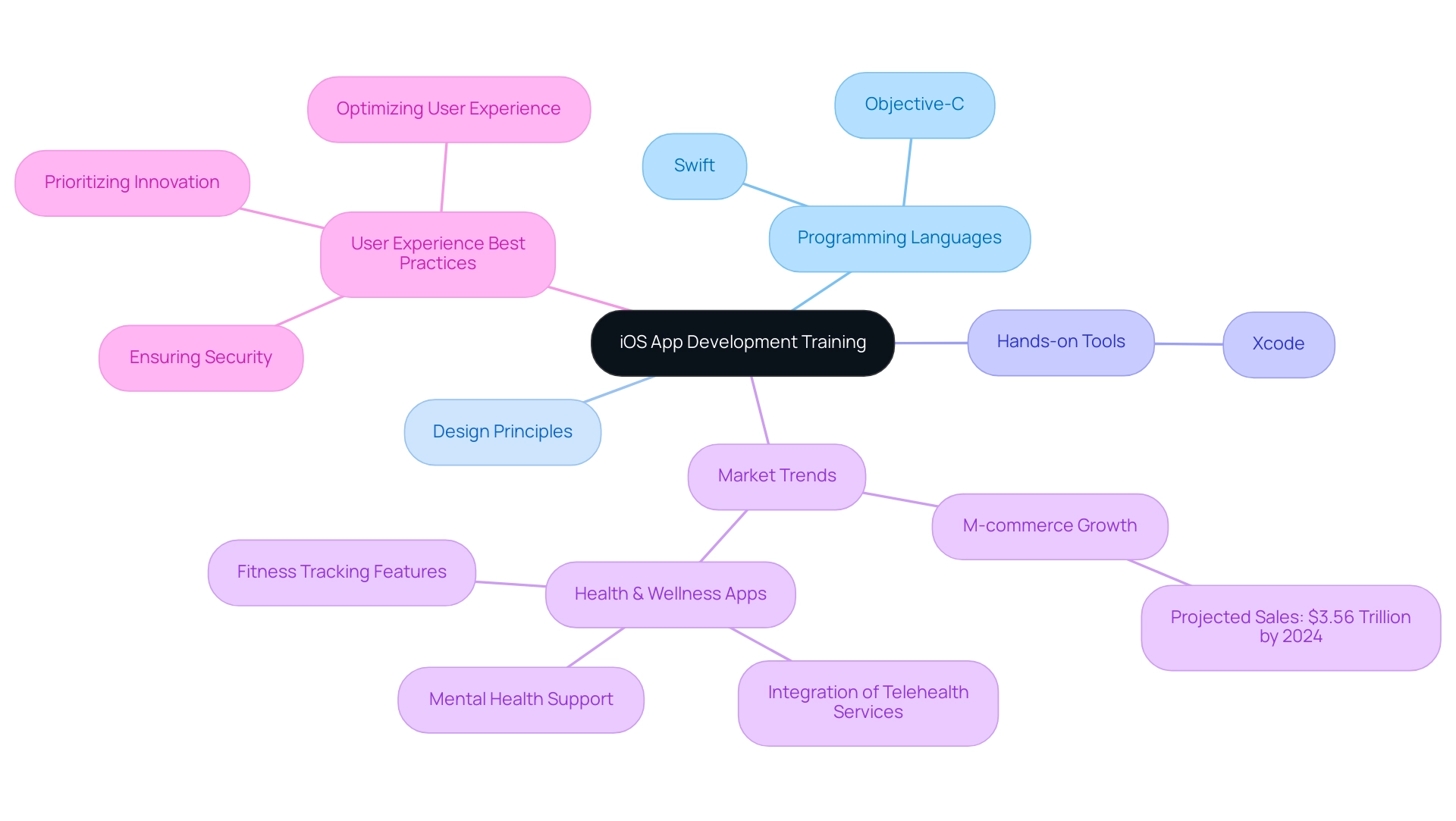
Key Skills Acquired in iOS App Development
Participating in iOS app development training equips individuals with a diverse array of essential skills vital for success in today's competitive landscape. A core component is proficiency in Swift programming, the language that has quickly become the standard for iOS creation due to its efficiency and modern syntax. Understanding the iOS SDK (Software Development Kit) is also critical, as it provides the necessary tools for building applications that seamlessly integrate with Apple's ecosystem.
Furthermore, through iOS app development training, students gain hands-on experience with interface design using UIKit, honing their ability to create intuitive and aesthetically pleasing user experiences. Training usually covers:
- App lifecycle management
- Debugging techniques
- Integration of third-party APIs
All of which are indispensable for developing robust applications that adhere to App Store standards. Additionally, familiarity with version control systems like Git is frequently part of the curriculum, enabling students to collaborate effectively within project teams. Significantly, it is essential to acknowledge that 10% of learning arises from formal education, encompassing courses and workshops, emphasizing the importance of organized instruction in this area.
Joe Tinston, Chief Product & Technology Officer at Bloom & Wild, highlights the significance of teamwork and varied viewpoints in creating effective solutions, demonstrating that these abilities are crucial to team achievement in the application creation process. His emphasis on a collaborative culture aligns with Paulo's encouragement for individuals to seek environments that value learning and growth, reinforcing the idea that supportive learning environments can lead to transformative career experiences. As Aleksandar Penev suggests, pursuing such environments can make these development programs invaluable for aspiring developers.
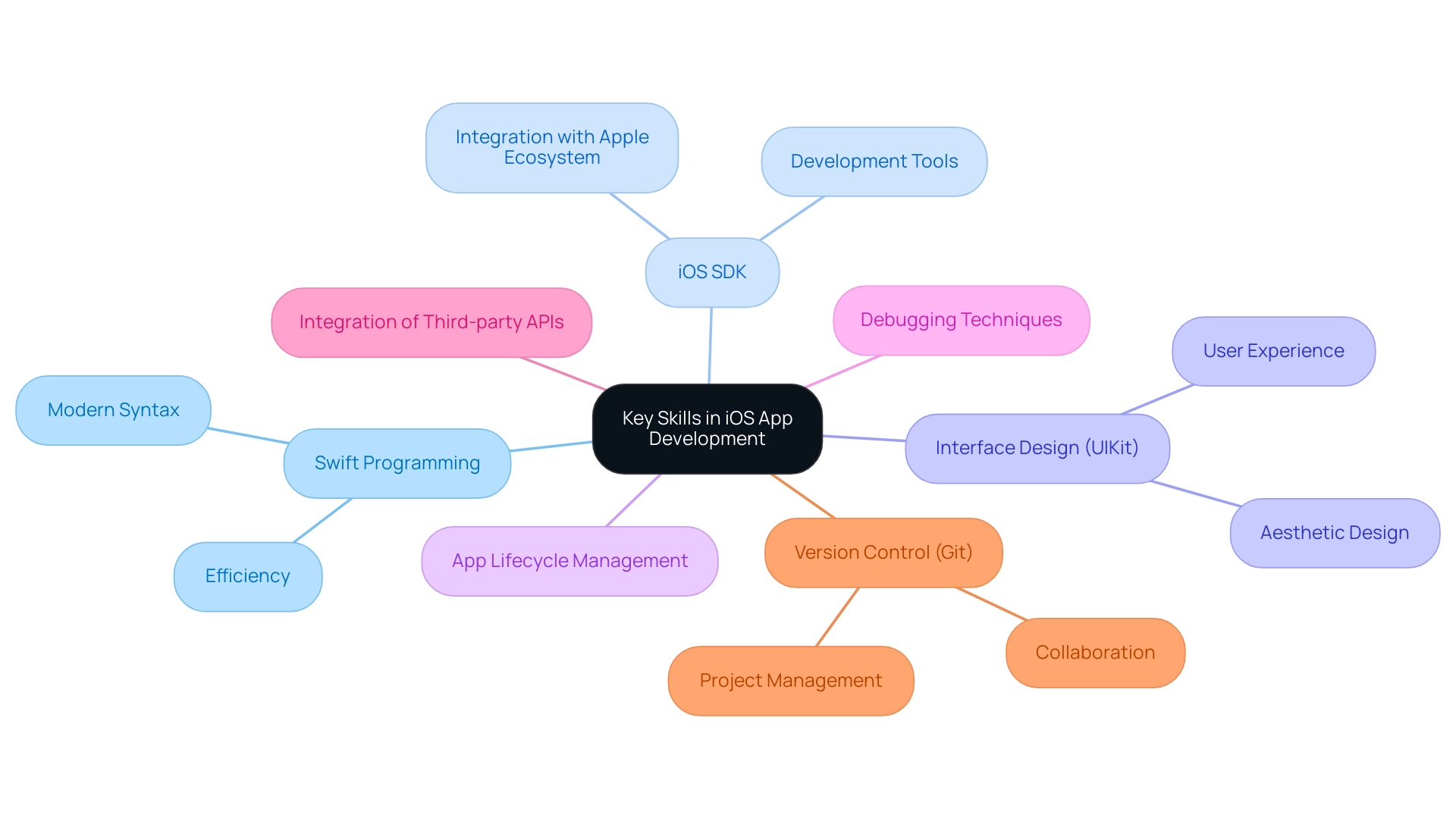
Prerequisites for iOS App Development Training
Prospective students looking to enroll in iOS app development training should possess a foundational understanding of programming concepts, particularly those related to object-oriented programming. Although some courses cater to absolute beginners, prior experience with programming languages such as Java or C++ can markedly enhance the learning experience. For instance, the University of Toronto offers a course with a 3.9 rating out of 5 stars based on 1.6K reviews, indicating a solid option for course selection.
This is critical, as companies are increasingly seeking iOS app development training for developers who can significantly contribute to the creation of industry-leading software. As one industry expert notes, 'Companies look for an iOS app developer who can contribute significantly to iOS app development training to create industry-leading software.' Furthermore, a fundamental understanding of web creation and design principles is beneficial as these concepts frequently influence mobile app creation practices.
Additionally, students may need to have access to a Mac computer, as Xcode—the main environment for iOS applications—is exclusively available on this platform. The key skills necessary for iOS app development training include:
- Proficiency in Swift
- Proficiency in Objective-C
These skills are highlighted in a case study on the skills needed for success in this field. As the landscape of iOS application creation evolves, potential learners in 2024 should be ready to meet these prerequisites to enhance their educational outcomes.
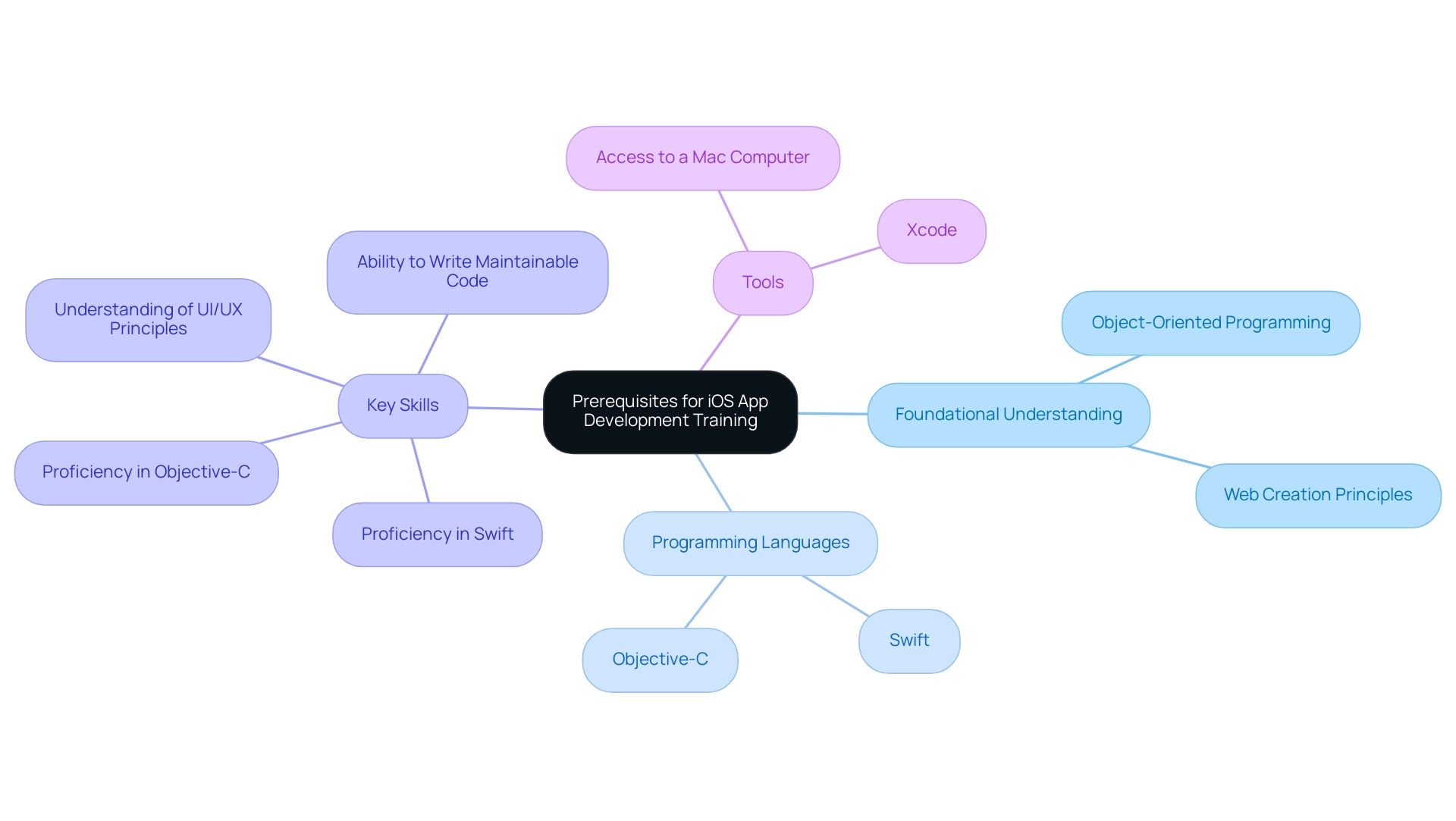
Exploring Different iOS App Development Course Options
The landscape of iOS app development training in 2024 offers a variety of formats, each catering to different learning preferences and career aspirations. Online courses stand out for their flexibility, empowering students to progress at their own pace while balancing other commitments. Conversely, boot camps provide iOS app development training through an intensive, immersive experience, designed to rapidly equip learners with essential skills in a condensed timeframe.
Notably, by Day 10, participants in boot camps often have a good understanding of how apps are built, showcasing the effectiveness of this format. University degree programs provide a well-rounded curriculum that includes iOS app development training, often blending theoretical knowledge with practical applications, which can be beneficial for those seeking deeper insights into the field. Furthermore, specialized courses available on various platforms for iOS app development training focus on niche elements such as user interface design or game development, thereby accommodating diverse interests and career trajectories.
A relevant case study titled 'Data Analytics in Apps' illustrates how data-driven decisions helped apps like Netflix tailor user experiences, underscoring the importance of analytics in improving content recommendations. According to recent analyses, both online and in-person learning formats have their merits; however, participants in immersive boot camp settings often report a heightened confidence in their abilities. As Chris C. aptly states,
Don’t worry if you falter, I’ll be with you every step of the way,
underscoring the supportive nature of these learning environments.
Ultimately, the choice between online versus in-person education hinges on individual learning styles, desired outcomes, and professional goals. Additionally, Day 13 includes a wrap-up challenge that allows students to apply their learned skills, further enhancing the practical aspect of their training.
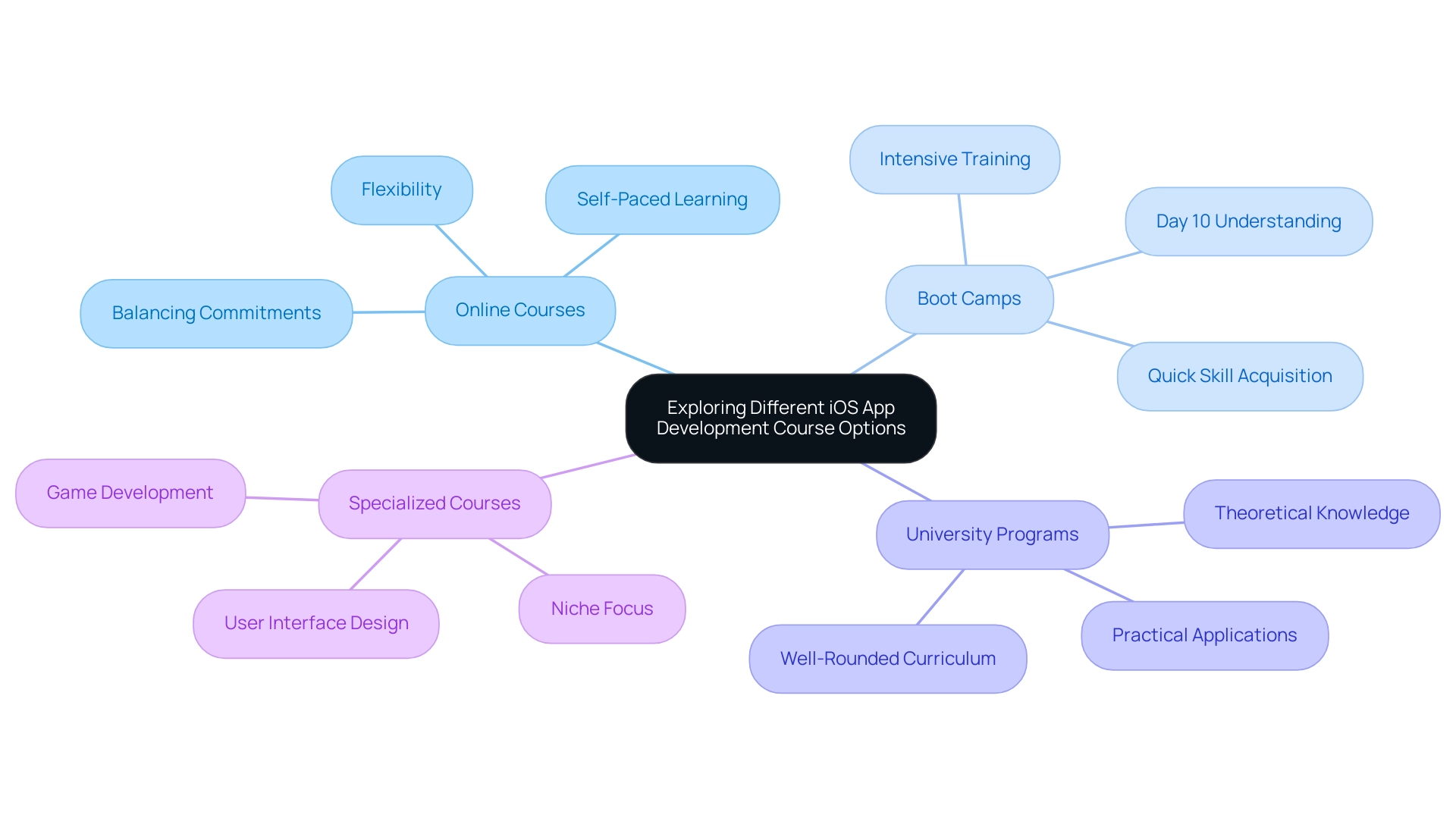
Certification and Career Opportunities in iOS App Development
Obtaining certification through iOS app development training plays a crucial role in enhancing a candidate's job prospects, as it serves as a validation of their skills and knowledge to prospective employers. Various certification programs are available, including Apple's own offerings, which are designed to equip developers with the necessary expertise. For instance, courses like the Foundations of Objective-C App Development and the Meta iOS Developer Professional Certificate are excellent resources for aspiring developers, as highlighted in the case study titled 'Preparing for a Role in iOS Development.'
The demand for mobile applications is surging, leading to abundant career opportunities in iOS app creation. Positions range from:
- App developers
- UI/UX designers
- Project managers
- Product owners
In fact, the latest statistics from the US Bureau of Labor Statistics forecast a 17 percent increase in demand for software developers, translating to 327,900 new job opportunities by 2033.
Moreover, experienced developers can explore freelance opportunities or establish their own app creation companies, leveraging the skills gained through iOS app development training. The most recent Tech Salary Guide from Mondo highlights the lucrative prospects in this field, identifying Mobile App Developer as the highest-paying title for developers, with salaries ranging from $100,000 to $175,000. To succeed in this competitive landscape, certified developers should also be aware of the guidelines for developing for the App Store, as outlined at https://www.apple.com/app-store/developing-for-the-app-store/.
These insights underscore the substantial impact that certification can have on job readiness and career advancement in the dynamic landscape of iOS app development training, particularly concerning the growing job opportunities and competitive salaries.
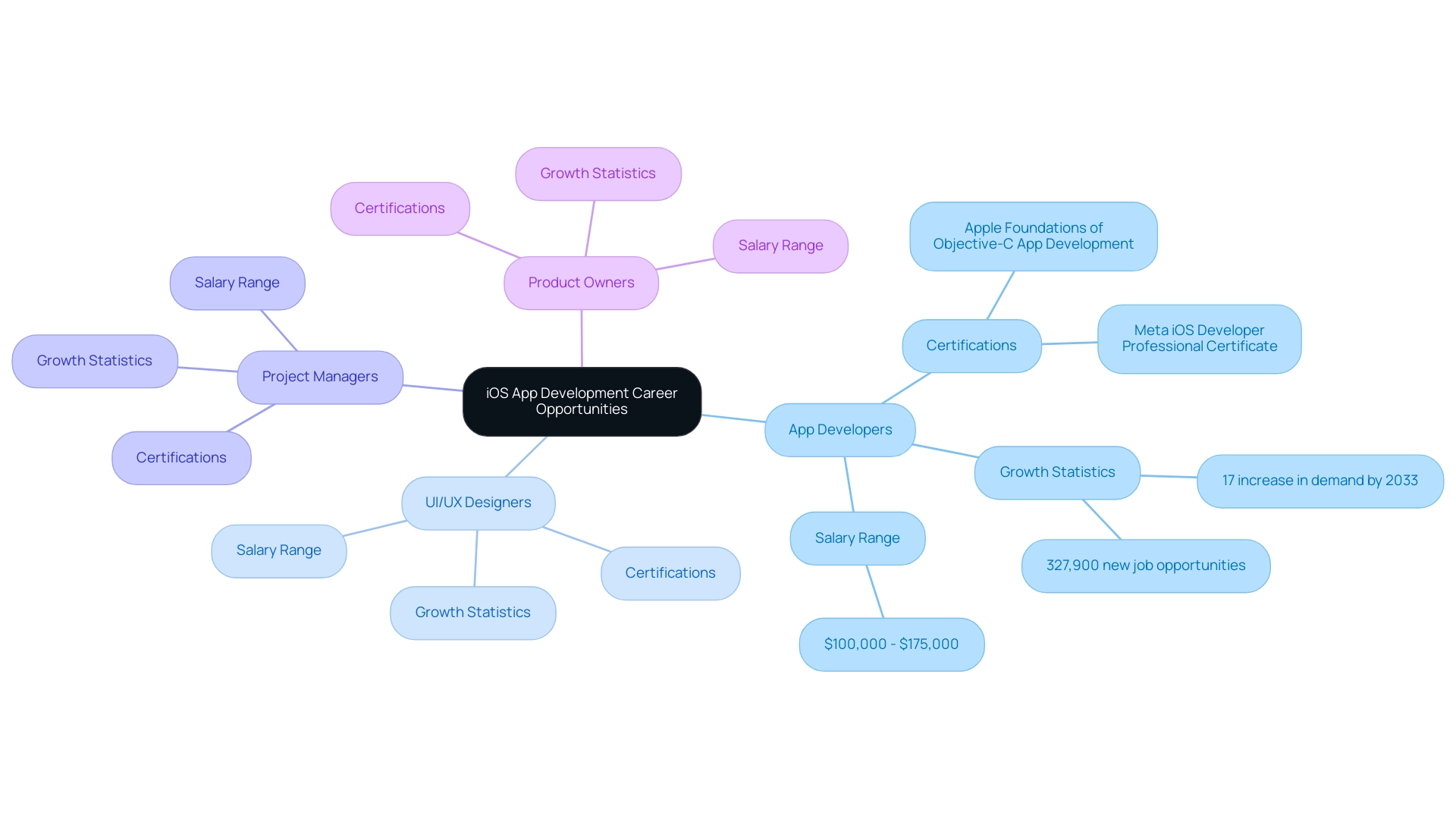
Conclusion
The journey into iOS app development is not merely an exploration of technology; it is an essential pathway for those aspiring to thrive in a rapidly evolving digital landscape. As outlined, comprehensive training programs provide the foundational skills necessary for success, including:
- Proficiency in programming languages like Swift and Objective-C
- Hands-on experience with industry-standard tools such as Xcode
The increasing demand for mobile applications, particularly in the health and wellness sector, underscores the urgency for aspiring developers to equip themselves with these critical competencies.
Moreover, the importance of collaboration and innovative thinking cannot be overstated. Engaging in a supportive learning environment fosters creativity and teamwork, essential elements for developing impactful applications. With various training options available—from online courses to immersive boot camps—individuals can select a path that aligns with their learning preferences and career aspirations. This flexibility is vital in a field that thrives on adaptability and continuous learning.
Certification further enhances job prospects, validating the skills acquired during training and opening doors to lucrative opportunities within the tech industry. As the job market for software developers continues to expand, the potential for career advancement becomes increasingly promising. For those ready to invest in their future, pursuing iOS app development training is not just a smart choice; it is a strategic move towards a successful and fulfilling career in one of the most dynamic sectors of the digital economy. Embracing this opportunity will undoubtedly position aspiring developers at the forefront of innovation and creativity in mobile app development.





